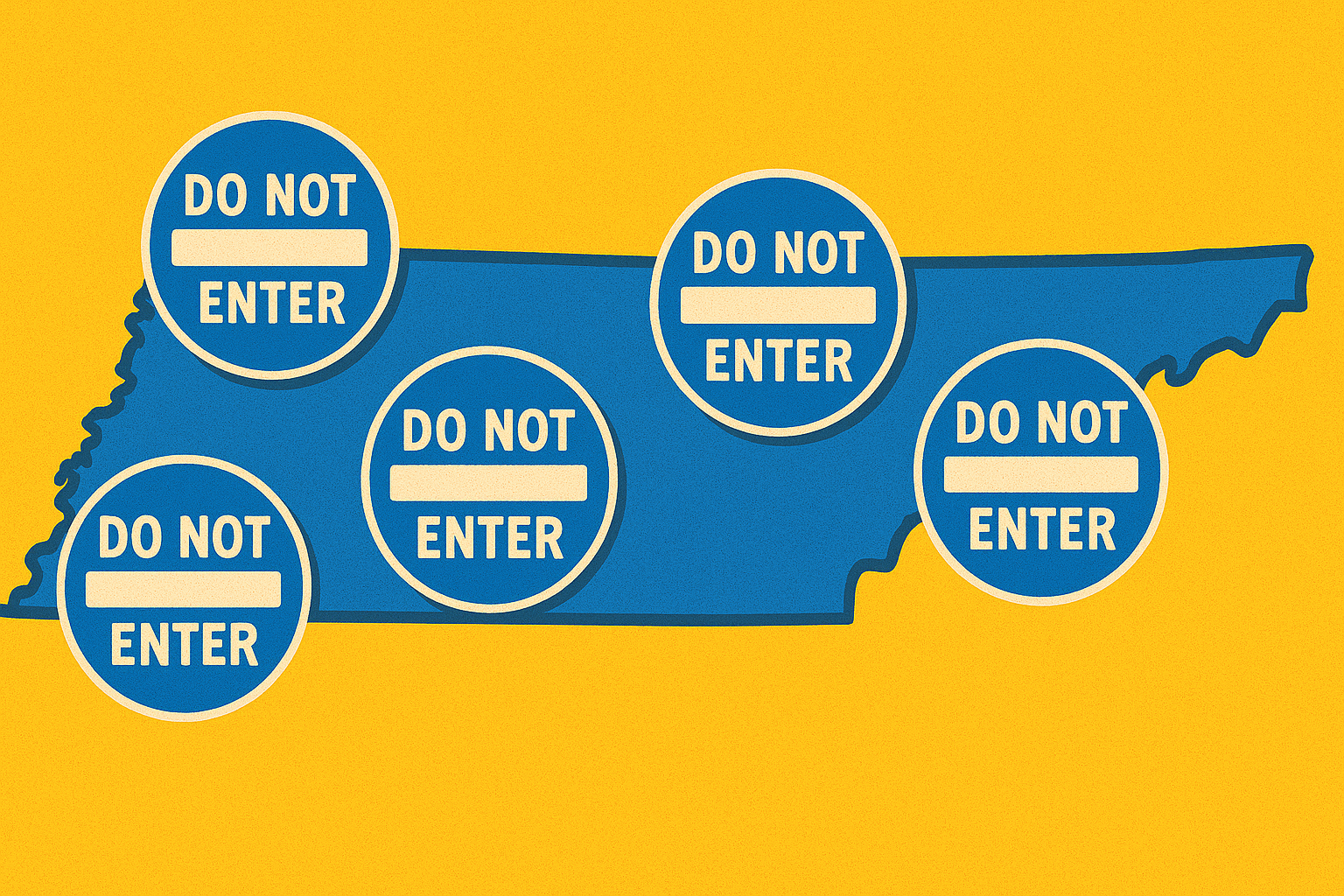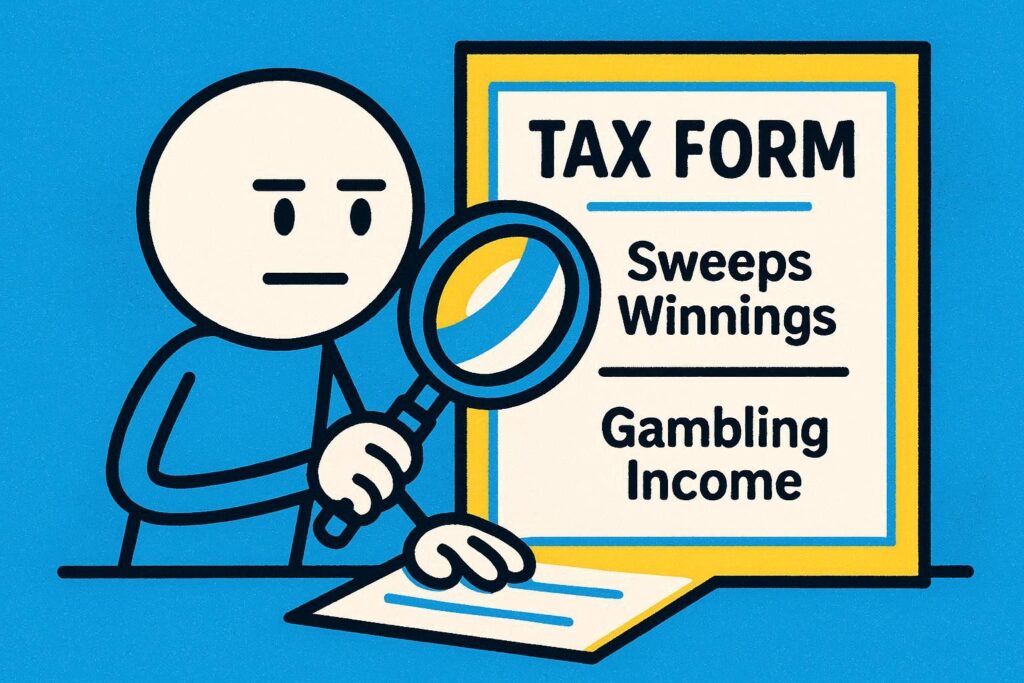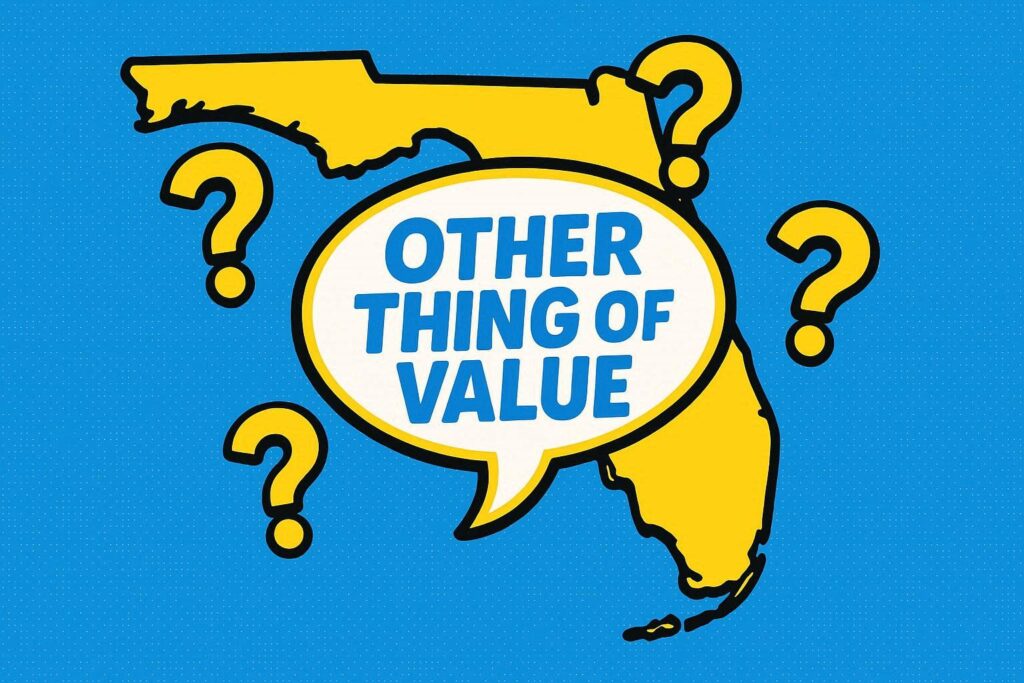A sweepstakes alternate method of entry (AMOE) is a way for individuals to participate in sweepstake contests or promotions, including those run by sweepstake casinos. Legally, AMOE is a secondary method for entering a sweepstakes that does not require the participant to pay or make a purchase. It must offer entrants an equal chance of winning as any paid entry method.
This requirement is rooted in US sweepstakes law.
Instead of wagering real money, players use virtual currencies, typically Gold Coins for entertainment purposes and Sweeps Coins that allow users to redeem winnings for real prizes. The legal structure of the model allows sweepstakes casinos to operate in multiple jurisdictions, even those where real-money online gambling is not legally available.
AMOE is central to sweepstake casino compliance. Absent a free entry method, these sites would be classified as gambling operations and subject to strict licensing requirements or outright bans in many states. AMOE satisfies legal requirements and also broadens access, making the games available to a wider audience.
⚠️ Why AMOE is important
AMOE is not optional for sweepstakes casinos. If a sweepstakes casino doesn’t offer a real, easy way to enter for free, US and state laws could classify it as illegal gambling or an illegal lottery. This is especially critical for sweepstake casinos, which depend on AMOE to differentiate themselves from unregulated real-money gambling sites and to maintain their legal status.
It’s essential for legal compliance and mitigation of risks. By not offering AMOE, a sweepstakes casino would be taking risks and crossing a legal line. Potential consequences could include fines or lawsuits, or even closure. If the AMOE is structured unfairly, such as being too complicated or providing worse odds compared to paid entries, that could lead to the same penalties.
🏛️ Regulatory scrutiny of AMOE in sweepstake casinos
Tennessee Advances Sweepstakes Bill SB2136 In Unanimous 8-0 Vote
Sweeps Casino Winnings & Taxes — An Expert Answers Our Questions
Florida Bills Advance, Raising Enforcement Stakes for Sweepstakes Casinos
Regulatory scrutiny of the AMOE model at sweepstake casinos has intensified. Authorities are increasingly skeptical of its use as a legal shield for operations that closely resemble traditional gambling. Recent in more than a dozen states underscore the current environment and the challenges that have emerged.
This enforcement action is representative of a growing regulatory stance: The mere presence of AMOE does not override broader prohibitions on unlicensed gambling if the platform resembles a casino in practice. In New York, ongoing debate and analysis has focused on whether sweepstakes casinos are using AMOE disingenuously.
AMOE itself has not been banned, but its effectiveness as a legal defense is under mounting pressure. The landscape is shifting from: “Is AMOE present?” to “Is AMOE meaningful?” The trend in enforcement and interpretation suggests that having AMOE available will not neutralize violations, especially if it appears primarily to mask pay-to-play casino mechanics.
🎯 What is the purpose of alternative method of entry?
AMOE provides a means to access contest entries without requiring a purchase. For sweepstakes casinos, AMOE serves the following purposes:
- Maintains compliance with “no purchase necessary” laws by providing a free entry method.
- Prevents sweepstakes from being classified as illegal gambling or lottery contests by removing the “consideration” element.
- Ensures all participants can access sweepstakes, regardless of financial status or means to participate.
- Promotes fairness and transparency by giving everyone an equal chance to win.
- Expands audience reach by allowing more people to participate.
⚙️ The overarching mechanics of AMOE
AMOE is a standard offering for sweepstakes casinos with a straightforward concept: Participants follow specific instructions to gain free entries. Here’s how it works in practice.
Online entry forms:
Users complete a digital form with basic information at no cost, making for a quick and accessible way to enter.Mail-in entries:
Participants send a handwritten card or letter with the details that the sweepstakes casino requires to a set address. This method often appears in the sweepstakes rules.Email entries:
Users email their entry information to a designated inbox. Entries are processed and added to the drawing in a trackable manner.Social media actions:
Users gain entries through actions such as liking, commenting, or following on social platforms, provided these actions meet AMOE standards.
Examples of AMOE in practice
To fully understand how it works, here are examples of AMOE in practice at three of the leading sweepstakes casino platforms.
- Chumba Casino: Offers an AMOE by allowing users to request free Sweeps Coins via mail without making a purchase. Users generate a unique code and send a handwritten request to the company while following the instructions in the terms and conditions.
- Luckyland Slots: Users can obtain free Sweeps Coins, no purchase required, by mailing a request to the operator’s address. For a successful redemption, users must generate a unique code from their account and follow instructions exactly, including handwriting and formatting.
- Fortune Coins: Users can request free Fortune Coins through a mail-in AMOE. The request has to follow the exact parameters that Fortune Coins outlines, including the user ID for your account and a specific handwritten statement.
🎯 Distinctions between real-money vs. sweepstakes
There are several distinct differences between traditional real-money online casinos and sweepstakes casinos. Real-money online casinos are licensed and regulated by state gaming authorities. They can only operate in select US states where online casino gambling is legal, such as Michigan, New Jersey, Pennsylvania, and West Virginia.
While playing on these platforms, customers deposit actual money and place real wagers on online slots, table games, and more. The platform accepts deposits and offers direct payouts for winnings. It’s a straightforward gambling experience for which there are tangible risks and potential financial rewards.
Sweepstakes casinos are designed to simulate the casino experience. Operators adhere to sweepstakes laws. This allows them to operate legally in most US states, including many that do not allow traditional online casino gambling. Instead of real money, players use virtual currencies while playing on these platforms.
Many sweepstakes operate on a dual-currency system. Typically, this consists of “Gold Coins,” which are for entertainment purposes, and “Sweeps Coins,” which offer promotional play and the chance to redeem real prizes. Users can choose to play in GC or SC mode and accumulate both types of coins in various ways.
Players can acquire Gold Coins as part of a sweepstakes casino welcome offer, by purchasing coin packages, via a daily login bonus, and other means. Sweeps Coins are available through free bonuses, social media promotions, or via an AMOE. Users can redeem them for real money prizes or gift cards after meeting specific playthrough requirements.
No direct gambling with real money occurs at sweepstakes casinos. Popular sweepstakes casino sites include Chumba Casino, Pulsz, LuckyLand Slots, and WOW Vegas. These platforms offer a variety of games and ways for users to receive free coins, providing an alternative to real-money gambling.
📊 Transparency and abuse concerns
Sweepstakes casinos must offer an AMOE by law. This allows participants to enter promotions for free and for the platforms to avoid being classified as illegal lotteries. However, some operators have been criticized for technically providing AMOE while actively discouraging its use.
Common abuse includes burying AMOE instructions deep within lengthy legal documents or terms and conditions pages. This can make it difficult for the average user to find, while the language can sometimes lack complete clarity and lead to confusion about the process. Others use outdated or incorrect information about the AMOE process.
Some require participants to complete numerous time-consuming steps for a small reward. Examples include requiring users to mail handwritten requests that require extremely specific formatting as well as their own self-addressed stamped envelopes and paper that meets specifications, making the process inconvenient compared to simply purchasing entries.
These practices have led to public complaints on platforms like Reddit and various review sites. Commenters have expressed frustration over the lack of transparency and a belief that the intent is to deter free participation. Some users report that even after following all instructions, their AMOE entries are delayed, ignored, or never acknowledged, fueling further distrust.
The transparent implementation of AMOE is a key indicator of the legitimacy and trustworthiness of a sweepstakes casino. This includes free entry methods that are easy to find, simple to use, and provide equal chances of winning. If the AMOE is tough to find, unclear, or unreasonably difficult, that can impact the site’s reputation.
🧭 Brief history and legal origins of AMOE
AMOE emerged in the late 20th century in response to growing concerns over deceptive sweepstakes practices. As sweepstakes became a popular marketing tool in the US, consumer complaints became widespread. Many consumers believed that purchases were necessary to win or that their chances improved with purchases.
Investigations followed, most notably by the Federal Trade Commission. Closer examination revealed confusion among participants and that sweepstakes operators were employing deceptive practices. The FTC played a crucial role in highlighting these abuses and set early consumer protection standards for promotional contests.
Congress enacted the Deceptive Mail Prevention and Enforcement Act of 2000, which became public law on Dec. 12, 1999, to address these issues. The federal law mandated that sweepstakes must clearly disclose that no purchase is necessary for participants to enter or win, the actual odds of winning, and the value of prizes.
The act required sweepstakes sponsors to provide a free and accessible AMOE. The purpose was to ensure that consumers could participate in these contests without any financial obligation. This removed the element of “consideration.” Absent that, the contest would count as an illegal lottery.
Alongside AMOE requirements, the concept of “equal dignity” emerged as a foundational legal principle. This means that sweepstakes casinos must treat all methods of entry, including the free AMOE, equally. Entries that you obtain without purchase must have the same chance of winning as those that you’ve obtained via purchase.
Additionally, the AMOE must be clearly disclosed and not made unduly burdensome or obscure. Courts and regulators have enforced this principle, penalizing companies that fail to give the AMOE equal prominence or make it difficult to access. For example, Coinbase settled a $2.25 million lawsuit in May 2025 for failing to clearly disclose a free entry method in a sweepstakes.
AMOE is now a standard legal feature of North American sweepstakes, ensuring fairness, transparency, and compliance with consumer protection laws. Federal and state authorities, guided by FTC standards, have strengthened AMOE requirements to protect consumers and preserve the integrity of promotional sweepstakes.
Citations and sources:
- FTC: https://www.ftc.gov/legal-library/browse/prepared-statement-federal-trade-commission-sweepstakes
- FTC: https://www.ftc.gov/lottery-sweepstakes
- Congress: https://www.congress.gov/bill/106th-congress/senate-bill/335
- Chumba Terms: https://www.chumbacasino.com/documents/250610-POL-CHU-T&Cs-14-1.pdf
- Luckyland Terms: https://luckylandslots.com/sweeps-rules
- MGC: https://www.msgamingcommission.com/images/uploads/Public_Notice_(June_2025).pdf
- NY AG: https://ag.ny.gov/press-release/2025/attorney-general-james-stops-illegal-online-sweepstakes-casinos
- Reddit: https://www.reddit.com/search/?q=sweepstakes+casinos&cId=108d7fe9-e690-4167-abc3-c62140bb093b&iId=6a40f7e3-b5f2-4a7f-b675-62937f9ce49d



